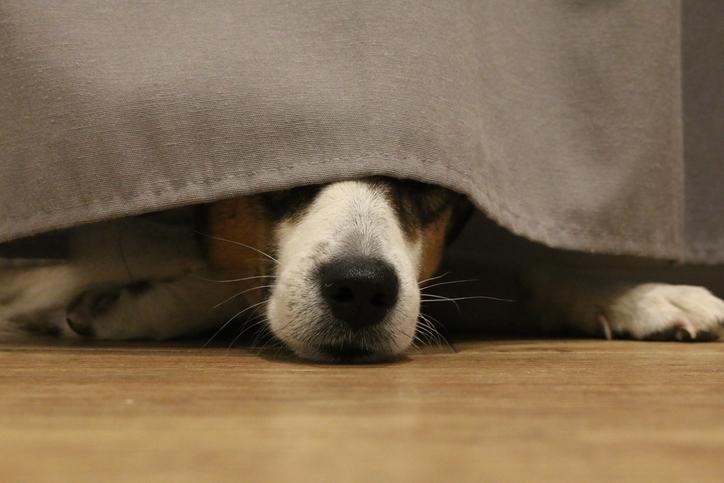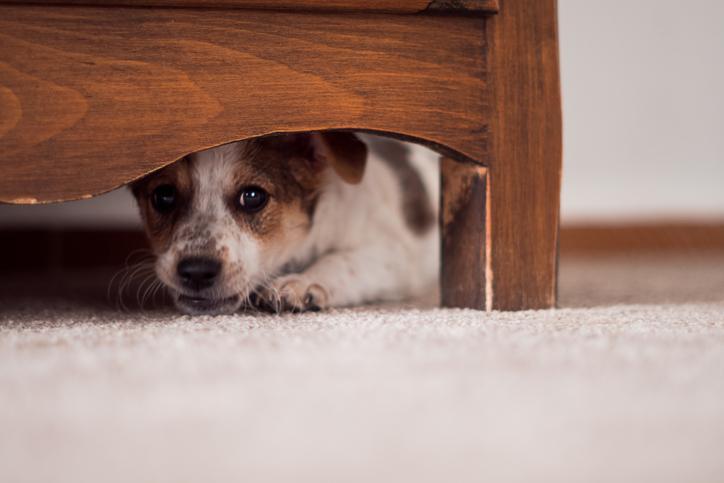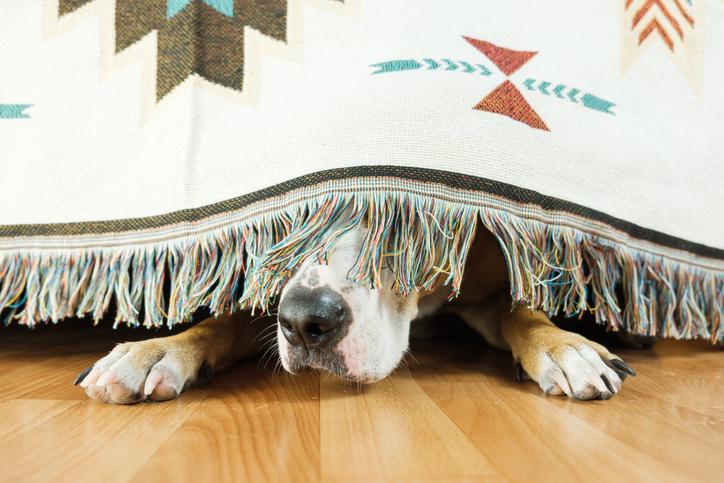My Dog is Hiding and Acting Strange

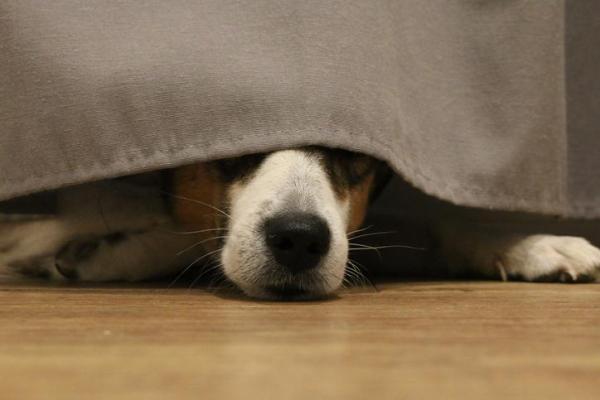

See files for Dogs
You may be aware that dogs often go somewhere quiet when they are about to die. For this reason, when you see your dog is hiding and acting strange, you may fear the worst. While it is a possibility we need to consider, there are many different reasons for this weird behavior in dogs. It may be a health issue, although not necessarily a fatal one. Similarly, there are psychological and circumstantial reasons your dog may be trying to hide somewhere peaceful.
In this AnimalWised article on my dog is hiding and acting strange, we show the importance of identifying the origin of the problem before jumping to conclusions. We will also discuss what we need to do to help our beloved dogs overcome this worrying problem.
Why do dogs hide when they are sick?
When a dog is sick, they tend to hide so they can find a safe and isolated shelter. While they may not have the cognitive ability to understand the reasons behind their illness, they do know that a weakened physical state makes them vulnerable. In the wild, predators, rivals and other dangers can threaten their well-being, so hiding is a form of protection. While you may not think your dog has anything to feel threatened by in your home, their natural instinct is strong.
However, we need to know that illness and disease is only one reason why a dog may go into hiding. We also need to be aware that each dog is an individual. While there are behaviors and instincts common to all domestic dogs, some dogs have certain idiosyncrasies which may involve hiding in certain places.
It is not only important to know possible reasons why your dog hides, you also need to know what is usual behavior for your canine. Getting to know their personality and habits is a vital part of forging a strong bond between dog and guardian.
The most frequent reasons a dog is hiding and acting strange include:
- Disease
- Cognitive dysfunction syndrome
- Fear
- Disgust
- Discomfort
To best work out why your dog is hiding or behaving irregularly, you will need to look at the overall context of their behavior. Take into account their personality and you will be able to make more sense of the situation.
My dog is acting strange
To understand why your dog is acting strange we need to define what is ‘strange’. Firstly, it is relative. If you think your dog is acting weird, it is because they are deviating from their normal healthy behavior. As we stipulate above, you need to know what is normal behavior for your dog before you can tell if anything has changed. For example, dogs may develop compulsive behaviors which they did not do beforehand.
A dog's behavior is informed by various factors. Genetic predispositions, whether passed down from specific family lineages or due to certain breed characteristics, can influence how they act. Their experiences early in life are also fundamental. The socialization period of puppies is particularly important. If they have not been socialized sufficiently, behavioral problems are likely.
Acting strange is also a vague signifier. We need to look at it more specifically as a symptom of a larger physical or behavioral problem. Apart from hiding away, we need to ask in what way are they behaving strangely? Is their gait affected? Are they vomiting? Are they making odd vocalizations? By looking at the entire symptomology of the dog we can get a better idea of why they may be hiding and acting weird.
When disease is affecting the dog, when different organs are affected, different symptoms emerge. For example, if the dog is suffering kidney problems, they may hide to lie down and minimize pain. If the dog is infected by rabies, the disease affects the brain, so they may be hiding out of confusion.
If they have already been diagnosed with an illness or disease, there may be another reason why your dog is hiding. Not all dogs understand the benefits of administering medication, especially if they have experienced it before. Whether administering a syrup, tablet or injection under the skin, the dog may find the process undesirable and hides in anticipation.
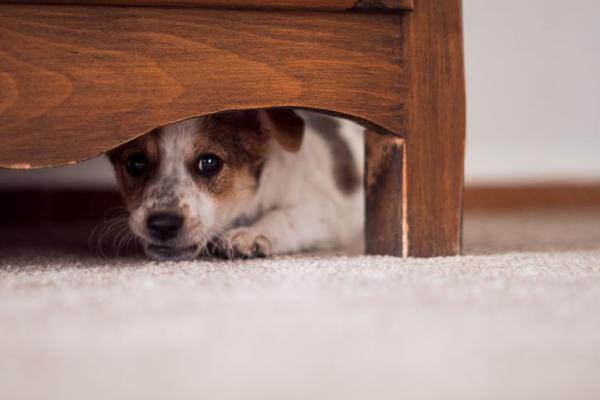
My dog goes to another room
When a dog acts weird, it is possible they may hide in a completely different room. One reason for this is possible disgust. Many people attribute various emotions to their dogs, sometimes negating their inherent nature in the process. The famed psychologist Stanley Coren claims it is unlikely a dog will have complex emotions such as guilt, pride or shame[1]. However, it is possible they can experience joy, fear, love, anger and even disgust.
If there is something in a part of the home which is disturbing or disgusting them, a dog may hide to get away from it. They may smell something which upsets their sensitive nose, hear an annoying sound or be disturbed by something. It can be difficult to determine what exactly is causing disgust in our dog. For example, a dog's nose is much more sensitive than ours. A scented candle might be fragrant to us, but overbearing to them.
Another reason a dog may go into hiding is fear. How easily a dog will become scared depends on their personality and circumstance. If your dog has been abused, has been poorly socialized or has suffered a traumatic incident, it is possible fear will come more easily to them. However, any dog can become fearful.
If you see your dog hiding and acting weird, look at their body posture and facial expression. If their head is lowered, they are cowering, their eyes dart around, their body is shaking or they show any signs of fear, then you will need to work out what is scaring them.
When we think our dog is either afraid of or disgusted about something, we need to find the source. This requires looking at the context. Sometimes it is quite obvious as there is a clear change to their environment. For example, during a fireworks display, many dogs will become frightened due to the strange noises. Hiding in another room is a common reaction to such loud sounds.
In other instances, the cause of their fear may be trickier to determine. One cause may be a change in our behavior. If we have recently scolded the dog or have undergone a personality change, the sensitivity of dogs may make them feel fearful they have done something wrong. We need to ask questions about what has changed. Have we moved recently? Is there a new family member? There are many reasons why our dog may want to hide. If we can't work them out ourselves, it may be necessary to ask a canine behaviorist or ethologist to intervene and provide some advice.
Some people believe that a dog may hide out of regret. There are many videos on YouTube purporting to show a dog in a state of regret, guilt or shame. However, analysts like Coren do not believe dogs can experience such complicated emotions as shame and they are all the better for it. What they do want to do is please their human guardian. It is possible they will hide if they are being scolded or they fear repercussion, but it is not due to a feeling of guilt.
My dog keeps going into the corner of the room
Another factor we need to consider is the age of the dog. Senior dogs may look to hide in corners due to something called canine cognitive dysfunction syndrome. Similar to Alzheimer's in human beings, this is a deterioration of the brain which can lead to behavioral changes. One particular change is a desire to seek out corners of a room to hide, something we see as acting strange.
The deterioration of the brain is progressive and results in various symptoms, including disorientation. The dog can become scared and seeking shelter in the corner of a room allows them to feel more secure. The confusion which accompanies CCDS manifests in various ways. They include searching places for refuge, wandering aimlessly, not recognizing family members, not responding to their name, reducing activity, defecating inside the home and many others.
Since CCDS is a progressive condition, these symptoms will not necessarily be obvious at the beginning. They may behave strange one minute and be back to their usual self the next. This is why it is so important to pay attention to even little changes in our dog. If we notice they are acting strange, it can't hurt to take them to the veterinarian for a check up. They can perform diagnostic tests to determine whether there is an underlying health problem or if there is anything they can do to slow the progression of the disease.

What to do if my dog is hiding and acting strange
If there is an obvious reason why the dog is hiding, you address said problem and the dog stops its strange behavior, then you may not need to do anything else. However, after reviewing the most common causes of why a dog is hiding and acting strange, it is important to highlight the importance of going to the veterinarian. By doing so, the first thing we can do is confirm or rule out a physical condition resulting in the odd behavior.
Once the appropriate diagnostic tests have been carried out, medical treatment will be prescribed in the case of disease. If the dog is otherwise physically healthy, we will need to address the behavioral or psychological problem. To do this, we will need to go to a dog trainer or canine ethologist. They can assess the individual circumstances of the dog, as well as looking at their home life. This is something best done by an outsider as we are not always able to appreciate the problem.
An experienced ethologist will be able to give us an action plan of how we can change their behavior. The most important thing is to do this in a positive way. We need to be encouraging and make their lives more comfortable. Negative reinforcement and punishment will only make the situation worse.

This article is purely informative. AnimalWised does not have the authority to prescribe any veterinary treatment or create a diagnosis. We invite you to take your pet to the veterinarian if they are suffering from any condition or pain.
If you want to read similar articles to My Dog is Hiding and Acting Strange, we recommend you visit our Other health problems category.
1. Coren, Stanley. (2013). Which Emotions Do Dogs Actually Experience? Retrieved on December 3, 2020, from https://www.psychologytoday.com/us/blog/canine-corner/201303/which-emotions-do-dogs-actually-experience
1. Carlson, & Giffin. (2002). Practical Canine Veterinary Manual. Madrid. Editorial el Drac.
2. Morris, D. (1988). Watch Your Dog. Barcelona. Janés Square.






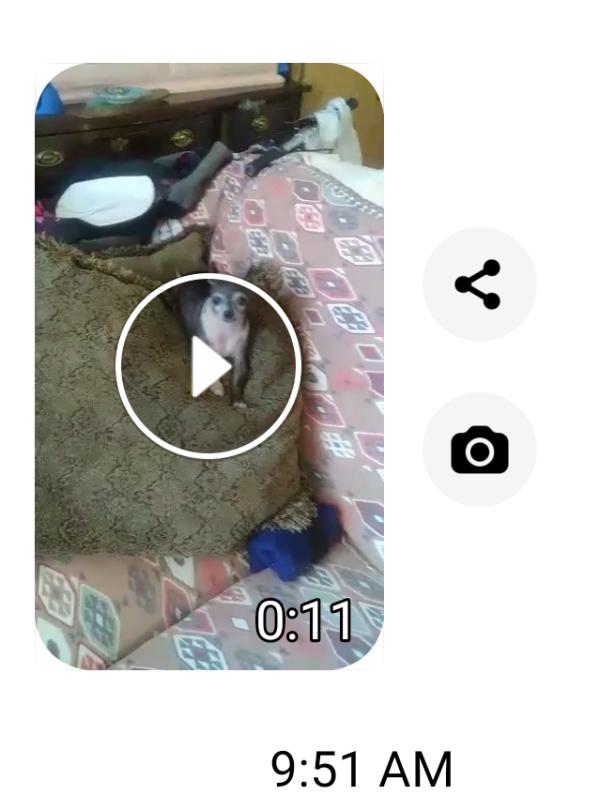 My neighbor has 9-year-old mini female Chihuahua her teeth are very bad super stinky and recently has as of yesterday and today been looking at her owner bobbing her head up and down which is not her usual at all
My neighbor has 9-year-old mini female Chihuahua her teeth are very bad super stinky and recently has as of yesterday and today been looking at her owner bobbing her head up and down which is not her usual at all
